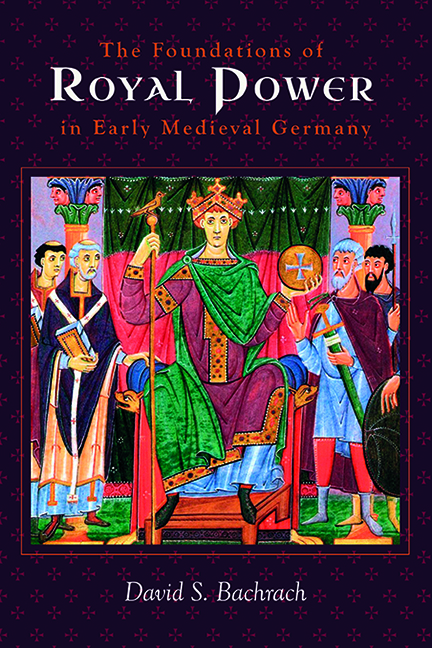 The Foundations of Royal Power in Early Medieval Germany
The Foundations of Royal Power in Early Medieval Germany Book contents
- Frontmatter
- Dedication
- Contents
- List of Illustrations
- Acknowledgments
- List of Abbreviations
- Maps
- Introduction
- 1 The Economy of Carolingian East Francia and Ottonian Germany
- 2 Material Assets of the Royal Fisc
- 3 Taxes, Tolls, and Other Regalian Rights
- 4 Ecclesiastical Resources at the Ruler’s Disposal
- 5 Toward an Analysis of Royal Expenditures: The Iter Regis and the Cost of Defense
- Conclusion
- Appendix 1 Fiscal Properties held by the Rulers of East Francia and Germany, 887–1106
- Appendix 2 Fortifications held by the Royal Government during the Reigns of Henry I and Otto I
- List of Key Terms
- List of Key Dates
- Bibliography
- Index
3 - Taxes, Tolls, and Other Regalian Rights
Published online by Cambridge University Press: 16 July 2022
- Frontmatter
- Dedication
- Contents
- List of Illustrations
- Acknowledgments
- List of Abbreviations
- Maps
- Introduction
- 1 The Economy of Carolingian East Francia and Ottonian Germany
- 2 Material Assets of the Royal Fisc
- 3 Taxes, Tolls, and Other Regalian Rights
- 4 Ecclesiastical Resources at the Ruler’s Disposal
- 5 Toward an Analysis of Royal Expenditures: The Iter Regis and the Cost of Defense
- Conclusion
- Appendix 1 Fiscal Properties held by the Rulers of East Francia and Germany, 887–1106
- Appendix 2 Fortifications held by the Royal Government during the Reigns of Henry I and Otto I
- List of Key Terms
- List of Key Dates
- Bibliography
- Index
Summary
As important as the estates of the fisc were in providing revenues, supplies, and labor for the use of the royal government, they were far from the only form of resources available to the East Carolingians and Ottonians. Revenues from what F. L. Ganshof described in the Carolingian context as “profits derived from the exercise of power” remained very important throughout the ninth, tenth, and early eleventh centuries. In comparison with the fisc, however, these sources of income and royal rights of the East Carolingian and Ottonian rulers have received very little attention, and are largely ignored in broader discussions of royal power and governance. This chapter, therefore, is intended to highlight the wide variety of ways in which the kings of East Francia and the early medieval German realm mobilized labor, money, and goods in kind to support their governments and implement their policies. The four main sections of this chapter consider in turn the fate of the late Roman fiscal regime and concomitant service obligations of the king's subjects, the problem of broad-based taxation in Carolingian East Francia and Ottonian Germany, the revenues associated with royal control over tolls, markets, and mints, and finally royal forestae. As was the case in the previous two chapters, much of the information about these sources of royal revenue as well as the labor and military service owed to the government by the king's free subjects comes from royal and private charters. These sources are complemented by historiographical works, letters, and legal texts, as well as by extensive material information developed through excavations.
The Fate of Late Roman Fiscal Obligations
The four main contestants in the lists regarding the fate of the late Roman taxation regime in the Merovingian kingdom and under the Carolingians into the ninth century are Jean Durliat, joined by Elisabeth Magnou- Nortier, Chris Wickham, and Walter Goffart, each of whom has attracted both considerable opposition as well as support for at least some of their major contentions. In broad terms, Durliat and Magnou-Nortier argue for substantial continuities in the late Roman fiscal system into the Carolingian period, although they do not insist on stasis or immutability as some of their critics have insisted. Wickham, conversely, argues for the inexorable breakdown of the Roman fiscal system, which he insists did not last much after the year 600.
- Type
- Chapter
- Information
- The Foundations of Royal Power in Early Medieval GermanyMaterial Resources and Governmental Administration in a Carolingian Successor State, pp. 121 - 180Publisher: Boydell & BrewerPrint publication year: 2022


